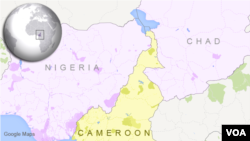Humanitarian challenges continue to mount in Cameroon, as refugees continue to flow in from Nigeria and the Central African Republic. The government and the United Nations are concerned about acute food shortages in the year to come.
The number of officially registered refugees in Cameroon has climbed to about half a million, with fresh arrivals coming from both Nigeria and the Central African Republic. That’s in addition to the over 200,000 people registered as internally displaced by the Boko Haram conflict.
But Najad Rochdi, coordinator of United Nations aid efforts in Cameroon, says the actual numbers of refugees and displaced people are much higher. Some people are still being registered, while others have sought shelter outside of camps.
The U.N. estimates the total number of refugees and displaced people in Cameroon to be as many as 1.6 million and warns that the number could climb to as high as 2.7 million.
Both the government and the U.N. say $310 million is needed over the next three years to meet the needs.
She said their highest worry is the increasing number of people vulnerable to food insecurity and malnutrition since more than two million people are already exposed to food insecurity.
Rochdi said on Cameroon's northern border where Nigerian refugees are found, there have been unpredictably long dry seasons, floods and unfavorable climate conditions that have hurt farmers. She said such factors are having direct impacts on the humanitarian situation of refugees and displaced persons so they have to look for means to handle it now.
Armed groups continue to operate freely in the Central African Republic, in particular in the countryside. Not only do refugees not want to return home, but as many as 20,000 more have arrived in the past 10 months.
And Cameroonian authorities have warned that despite recent military successes against Boko Haram, the war against the terrorists is not over.
Cameroon's minister of territorial administration, Rene Emmanuel Sadi, said host populations near the border with Nigeria are abandoning their farms for fear of insurgent attacks. That has aggravated the food crisis.
He said Cameroon is counting on international donors, friendly countries and the U.N. to execute the emergency response plan it has prepared to take care of both refugees and internally displaced persons.
The Boko Haram insurgency, now in its eighth year, has spilled over to Cameroon, Chad and Niger. According to the United Nations, more than 25,000 people have lost their lives and over two million have been displaced.





